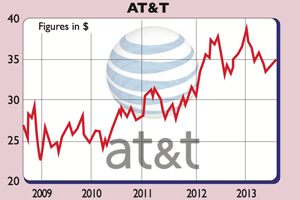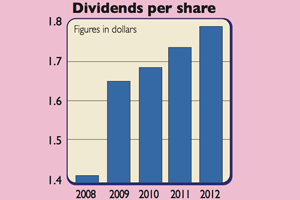Shares in focus: Should you buy AT&T?
Telecoms giant AT&T faces stiff competition in America. But should you buy the shares for the income? Phil Oakley investigates.
Get the latest financial news, insights and expert analysis from our award-winning MoneyWeek team, to help you understand what really matters when it comes to your finances.
You are now subscribed
Your newsletter sign-up was successful
Want to add more newsletters?

Twice daily
MoneyWeek
Get the latest financial news, insights and expert analysis from our award-winning MoneyWeek team, to help you understand what really matters when it comes to your finances.

Four times a week
Look After My Bills
Sign up to our free money-saving newsletter, filled with the latest news and expert advice to help you find the best tips and deals for managing your bills. Start saving today!
At these prices, the income from dividends is not to be sniffed at, says Phil Oakley.
Dividends account for a big chunk of the returns you get from owning shares. This is even more the case if you reinvest the income over the years (dividend compounding').
Therefore, buying the shares of companies that pay decent dividends has always been a popular strategy. And in recent years, with interest rates at rock-bottom, dividends have become an even more important source of income for many private investors.
MoneyWeek
Subscribe to MoneyWeek today and get your first six magazine issues absolutely FREE

Sign up to Money Morning
Don't miss the latest investment and personal finances news, market analysis, plus money-saving tips with our free twice-daily newsletter
Don't miss the latest investment and personal finances news, market analysis, plus money-saving tips with our free twice-daily newsletter
So it's no surprise that the share prices of many of these companies have done very well in recent years. And as a result, it's become a lot harder these days to find dependable, high dividends at a decent price as we discuss in this week's cover story.
However, it seems that shares in AT&T America's equivalent of our BT have missed out on the income stock party. Its shares have only gone up by 2% over the past year, even as the S&P 500 index has soared to record highs.
This can be partly explained by the higher taxes that Americans now have to pay on their dividends, which has resulted in big payers such as telecoms and utilities companies falling out of favour.
But many analysts are also concerned about AT&T's ability to keep its dividend payout growing. Is the firm on the ropes? Or does it represent a good opportunity for British investors who are keen to diversify their sources of dividend income?
The bear case
Let's start with the bear case. AT&T is no different to many incumbent telecoms companies around the world. Not only have its markets opened up to competition, but the traditional voice-only phone businesses are slowly declining year after year. Yet the firm needs plenty of spare cash to pay all its costs, including some very large pension-fund liabilities.
AT&T has a big mobile telecoms business in a very lucrative and growing US market. But there are worries here too. Some analysts are concerned that competition is too fierce and that AT&T might lose out.
Verizon Wireless has been doing well in this market, not least because it has a mobile network that offers a greater range of coverage than AT&T's. Other players such as T-Mobile and Sprint also want a bigger slice of the cake, which may hurt AT&T's prospects.
Then there's the worry that the company might be tempted to do an expensive international deal. In recent months, chief executive Randall Stephenson has talked about the big opportunity for someone to upgrade mobile network in Europe to US standards with faster download speeds and reap the rewards.
This sort of talk has led to speculation that AT&T might buy Vodafone. Vodafone would cost the company a lot of money and it might not give much back in return, given that it is struggling to grow in Europe at the moment and is having to run hard to stand still. Some analysts are concerned that paying too much for Vodafone might force AT&T to cut its dividend.
It's not all bad news
AT&T is far from being a basket case, though. In fact, it's doing quite well. It has grown its dividend for 29 years in a row and looks like it can keep increasing it for a while yet, albeit by quite small amounts.
Just like BT in the UK, AT&T is making a good fist of holding on to its domestic customers by offering bundles of services. Its U-verse' high-speed internet and TV product is growing quickly, with ten million households on board, which is helping to offset the declining voice business.
With faster fibre-based internet being rolled out, the company is in a good position to woo more customers and stop existing ones from leaving.
In mobile communications, AT&T is managing to keep growing and to hang on to most of its customers. Its 4G network looks set to at least rival those of its competitors in terms of speed and reliability and will be finished next summer.
This should give it a competitive edge. It has already been selling lots of smartphones and tablets and signing customers up to more profitable contracts. 4G should help increase this business.
On balance, AT&T's dividend looks very safe and is backed by strong and resilient free cash flows. Its recent third-quarter earnings grew by just over 6%, with Wall Street analysts expecting 6%-8% growth over the next couple of years.
The recent sale of Vodafone's stake in Verizon Wireless has also shown that there is a lot of value in the US mobile telecoms business. With wireless accounting for about three-quarters of AT&T's trading profits it could be argued that this value has been slightly undervalued by the stock market.
So with a decent yield and some modest growth in dividend payouts, investors might just get a reasonable return by buying the shares at current prices. In a world that's increasingly short of decent income opportunities, a bit of foreign income from AT&T looks worth having.
Verdict: buy for dividends
A note on withholding tax
If you are tempted to buy American shares, make sure you don't pay too much tax on the dividends you receive. Typically, dividends have 30% withheld as tax when they are paid.
By filling out a W-8BEN form before you invest, you can have this tax reduced to 15%. Put the shares in an individual savings account (Isa) or a self-invested personal pension and there is no more tax to pay.

AT&T (NYSE: T)Share price: $35.20Market cap: $185.8bnNet assets (September 2013): $86.1bnNet debt (September 2013): $74.9bnPrice/earnings (prospective): 14.3 timesYield (prospective): 5.14%Yield for UK investors (after 15% withholding tax): 4.37%Interest cover: 7.4 timesDividend cover: 1.4 times

What the analysts sayBuy: 7Hold: 23Sell: 3Target price: $37.42
Directors' shareholdings
R Stephenson (CEO): 252,650J Stephen (CFO): 72,266J Sankey (Strategy): 203,335
Get the latest financial news, insights and expert analysis from our award-winning MoneyWeek team, to help you understand what really matters when it comes to your finances.
Phil spent 13 years as an investment analyst for both stockbroking and fund management companies.
-
 Average UK house price reaches £300,000 for first time, Halifax says
Average UK house price reaches £300,000 for first time, Halifax saysWhile the average house price has topped £300k, regional disparities still remain, Halifax finds.
-
 Barings Emerging Europe trust bounces back from Russia woes
Barings Emerging Europe trust bounces back from Russia woesBarings Emerging Europe trust has added the Middle East and Africa to its mandate, delivering a strong recovery, says Max King